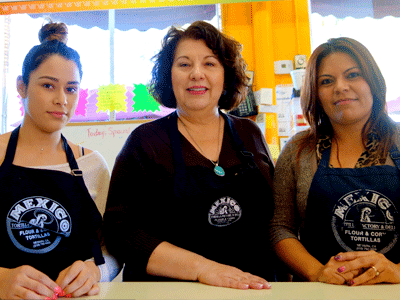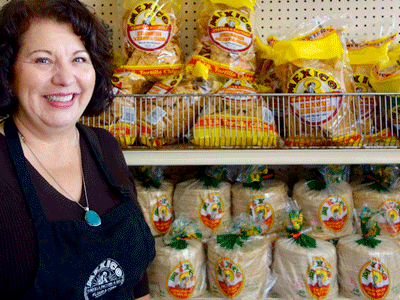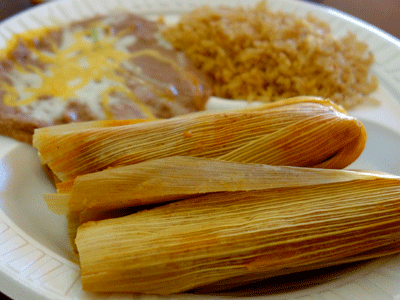
Local tortilla factory honors old-world values ----
“My dad only had a third grade education, so he’s proof that if you work hard you can do anything you put your mind to,” said Susana “Sucy” Collazo.
We’re sitting at a small table inside Mexico Tortilla Factory, a restaurant, market and tortilla factory in downtown Newark. Sucy’s parents started the business in 1970 and it has become a well-known and well-loved destination for Mexican food and food products.
The walls are golden yellow, the shelves are stocked full of products from Mexico, and the line of people ordering burritos, tacos, and pozole keeps growing. While the menu features typical taqueria food, the star of the menu is clearly the masa, the fresh corn dough used to make tamales, chips, and tortillas of all sizes. The busy factory is just behind the restaurant walls.
 Collazo’s father first started making tortillas as a side venture while working at General Motors. “My parents immigrated here from Nuevo Leon, Mexico in 1955,” said Collazo. “My mom was used to doing seasonal work, but my father wanted something full-time.”
Collazo’s father first started making tortillas as a side venture while working at General Motors. “My parents immigrated here from Nuevo Leon, Mexico in 1955,” said Collazo. “My mom was used to doing seasonal work, but my father wanted something full-time.”
Collazo’s father would go to work in the morning, return home to make tortillas and sleep for a few hours and then go back to work. When the tortilla business started to grow rapidly, he quit his job at General Motors. The family business now has six vans for delivery and the factory runs for about 12 to 13 hours per day to produce thousands of pounds of masa.
Even with big production, Mexico Tortilla Factory manages to make its products natural, authentic – instead of processed corn flour, they use fresh ingredients. They also use stone mills for grinding, a technique that dates back centuries.
“Everything— taco shells, chips, tostadas, thick huarache-style tortillas, and thin tortillas in all sizes — they’re all made out of corn, water and lime,” says Collazo.
The difference of the natural-only ingredients is clear in the sweet smell of toasted corn that radiates from the tortillas and the moist tamales. At Christmas time, the line to pick up tamales runs through the store and out the door.
“Corn has been around in Mesoamerica since before Christ,” said Collazo. “It’s our heritage, our past, our roots, and it’s important to talk about that with young people because so many history classes don’t teach us about where we came from.”
 After Collazo’s father passed away, she took management of the business, with the help of her family. They worked to grow the business and create new ways to celebrate food and culture, such as tamale-making classes and community events for Dia de los Muertos and other celebrations. She says her son will take over the business when she retires— if she ever does.
After Collazo’s father passed away, she took management of the business, with the help of her family. They worked to grow the business and create new ways to celebrate food and culture, such as tamale-making classes and community events for Dia de los Muertos and other celebrations. She says her son will take over the business when she retires— if she ever does.
“I don’t know if I can ever retire - I miss my customers when I’m not here,” she said, adding that many of her customers have watched her grow up. “Someone once asked me, what’s the difference between here and another taqueria? Well, when you come here, it’s like coming to your tia’s house to have a bowl of pozole or menudo… you’re coming home.”
Two years ago, Collazo was elected to Newark city council, running on a platform for education, safety and seniors. She’s also vice president of AVANZANDO, a coalition that provides scholarships and leadership training for Latino youth. She’s often pulled away for council business on weekends, but you can still find her at the factory store, greeting each customer and occasionally teaching a tamale-making class (the next class is on December 7).
A first visit to the factory could be imagined as a cultural excursion to a destination that honors the traditional and authentic. I recommend the pork tamales and the pozole as the first ways to taste the old-world values of this special place.
